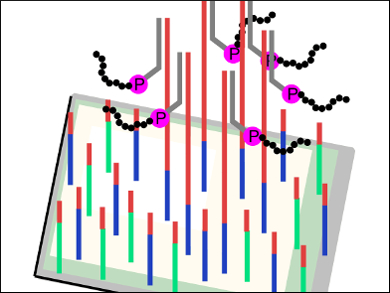Peptide libraries are invaluable for both drug discovery and enzyme screening assays. However, until now they include only peptides in solution. To synthesize a massively parallel assay of peptides that is linked to a solid surface could provide breakthroughs for screening drug candidates and as peptide display libraries.
Samie R. Jaffrey, Cornell University, New York, USA, and colleagues repurposed a “next-generation” Illumina DNA sequencer to prepare such peptide libraries. The process begins by synthesizing localized spots of short DNA sequences that all contain the same sequence, the standard protocol for an Illumina machine. Then the researchers used DNA primers to encode RNA nucleotides at the end of the DNA, which became the gateway to synthesizing RNA libraries on the chip using a specialized polymerase. Finally, these RNA libraries were translated into peptides using in vitro-prepared ribosomes. The resulting peptides were linked to the RNA strands using the antibiotic puromycin.
The clusters of peptides that were “displayed” on the surface of the chip were found to be functional for detection by antibodies. By creating these spatially focused peptide libraries, the researchers have developed a valuable tool for studying the interaction of biomolecules with peptides in a high-throughput fashion.
- Peptide Synthesis on a Next-Generation DNA Sequencing Platform,
Nina Svensen, Olve B. Peersen, Samie R. Jaffrey,
ChemBioChem 2016.
DOI: 10.1002/cbic.201600298



